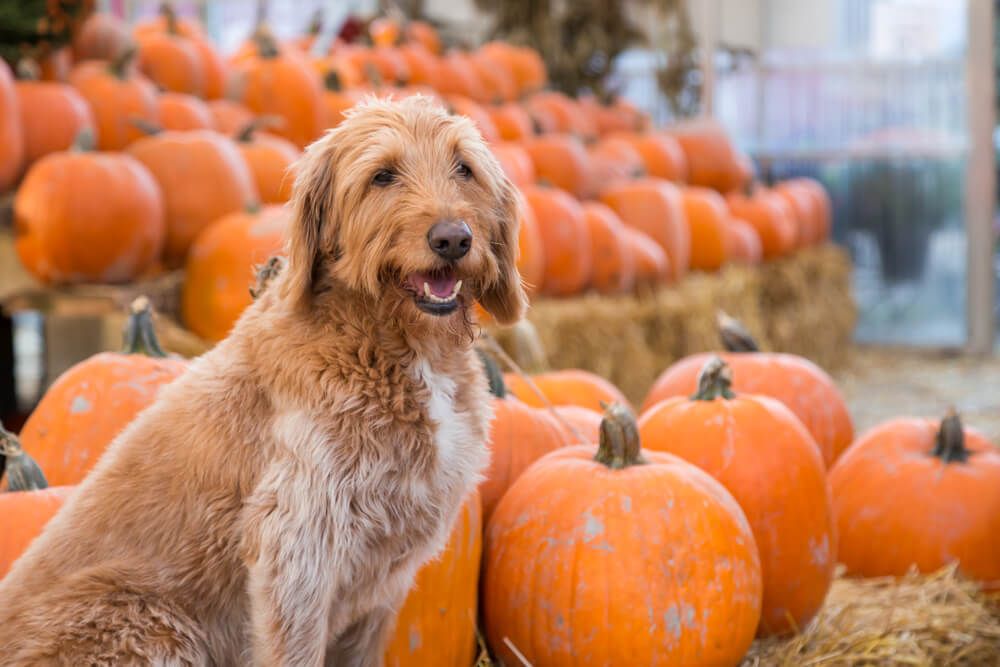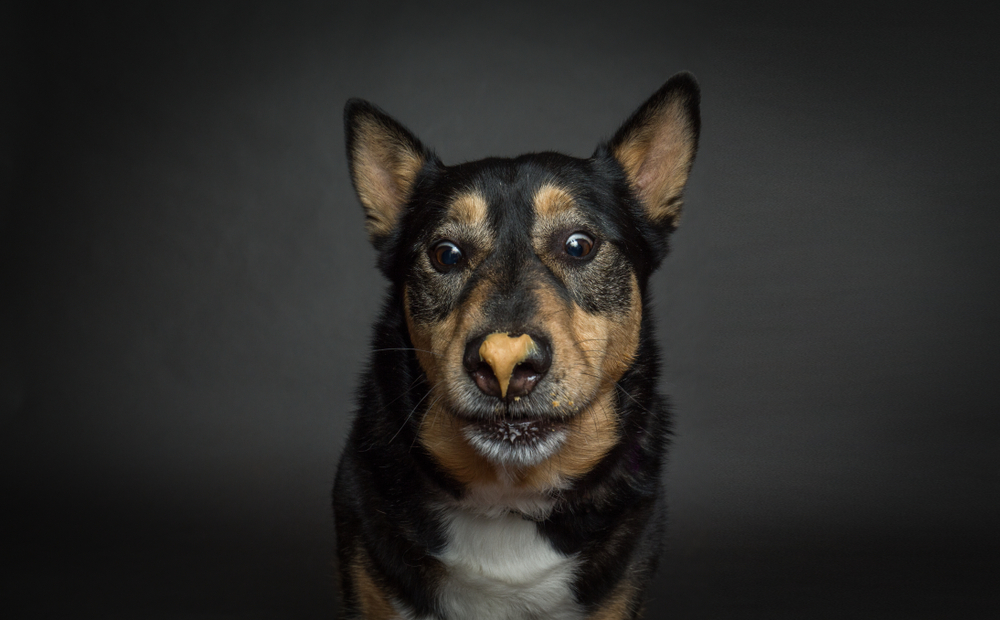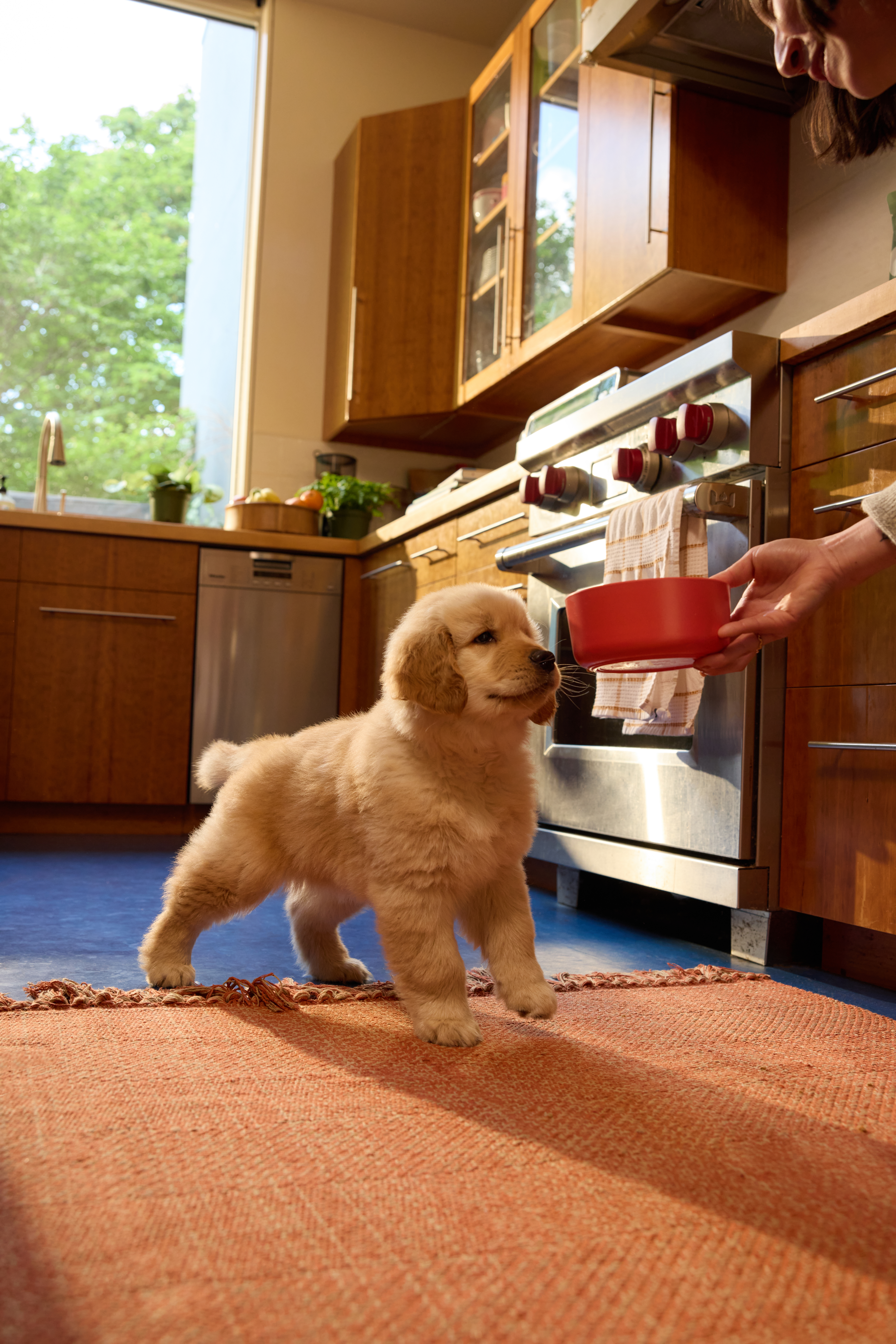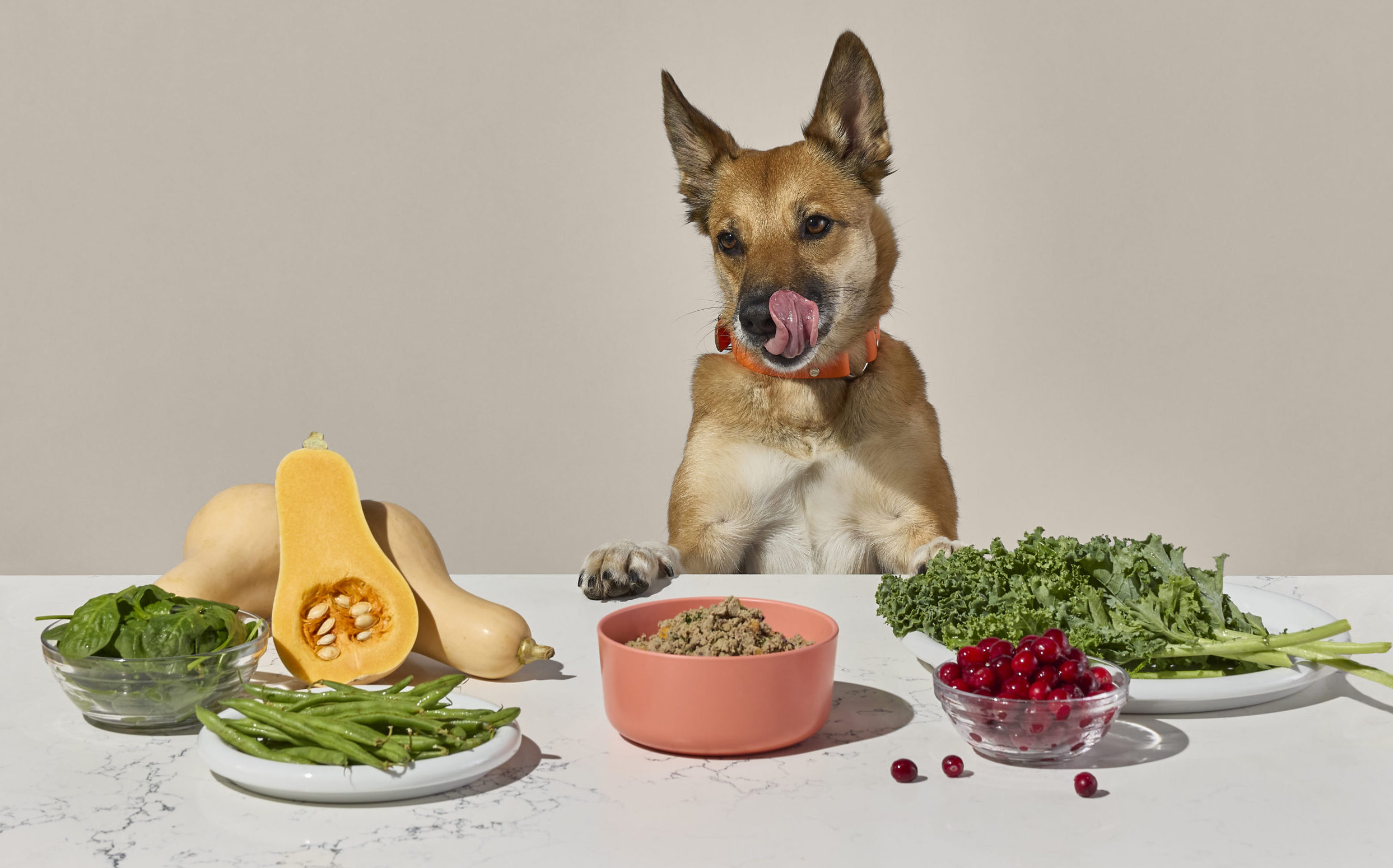Hey Ollie blog readers! We’re offering you an exclusive 60% OFF your starter box! Try now!
With the growing popularity of pumpkin spice everything, you might even see more pumpkin products being advertised to your dog. This is for good reason, as in many cases pumpkin can have some serious health benefits. But before you start scheduling PSL dates with your pup, read on for the deets – Can dogs eat pumpkins? And what are the potential health benefits?
Can Dogs Eat Pumpkin?
Yes—dogs can eat pumpkin, and in many cases, it can actually be good for them. Pumpkin is a safe, dog-friendly food that’s low in calories and packed with nutrients. The key is to stick with plain, cooked pumpkin—nothing with added sugar, spices, or artificial ingredients.
The best options are plain canned pumpkin (100% pumpkin puree) or fresh, cooked pumpkin with the skin and seeds removed. Avoid canned pumpkin pie filling, which often contains sugar, cinnamon, nutmeg, and other ingredients that aren’t safe for dogs.
Pumpkin can be a helpful addition to your dog’s diet in small amounts. You can mix it into their meals, use it as a treat, or even freeze it in small portions for a cool snack. But like any food outside of their normal meals, it should be served in moderation. Too much pumpkin can lead to stomach upset or throw off your dog’s nutritional balance.
Before making pumpkin a regular part of your dog’s routine, it’s always a good idea to check with your vet—especially if your pup has underlying health conditions or is on a special diet.
Is Pumpkin Good for Dogs?
You might have heard of dog owners using pumpkin as a remedy for a number of gastrointestinal maladies—everything from diarrhea to constipation—but is pumpkin safe for dogs?
In most cases, yes, pumpkin can be a healthy part of a dog’s balanced diet. With its naturally-occurring fiber and rich concentration of vitamins, pumpkin has a myriad of benefits for your pup. However, as is the case with any ingredient you add to your dog’s food bowl, there are some precautions you need to keep in mind.
Benefits of Pumpkin for Dogs
In most cases, a pumpkin can make a healthy dog even healthier. The popular squash is low in calories to ward off obesity and high in fiber to promote a strong digestive system. Pumpkin is a good source of carbohydrates, which provide your dog with instant energy.
The vitamins and minerals in the orange fruit (pumpkin is not technically a vegetable) provide great benefits for your pup as well.
Pumpkins are rich in carotenoids, vitamin E, iron, and potassium. Carotenoids encourage skin health and eye health, while vitamin E acts as an anti-inflammatory and helps with heart function. Iron encourages the production of hemoglobin, and potassium ensures that muscles and nerves work properly.
These benefits of sharing pumpkin with your dog are why we at Ollie add pumpkin to our Turkey Recipe. The pumpkin is mixed with turkey breast, kale, lentils and carrots as well as things like chia seeds and cod liver oil for a delicious and nutritious meal.
This simple, fiber-rich food can support digestion, help regulate weight, and even soothe upset stomachs. Below are a few of the most common health benefits of pumpkin for dogs
1. Improve Digestive Health
Pumpkin is well-known for helping dogs with both constipation and diarrhea. It’s rich in soluble fiber, which can absorb excess water in the digestive tract and firm up loose stools. At the same time, the moisture and fiber content can help get things moving when your dog is backed up.
2. Supports Healthy Weight
Because pumpkin is low in calories but high in fiber, it can help your dog feel full without adding extra calories. This makes it a smart snack for dogs who need to shed a few pounds or maintain a healthy weight.
3. Rich in Nutrients
Pumpkin is a good source of vitamins A, C, and E, as well as potassium and iron. These nutrients support immune health, skin and coat health, and energy levels.
4. Natural Prebiotics
Pumpkin acts as a prebiotic, helping fuel the good bacteria in your dog’s gut. A healthy gut microbiome can lead to better digestion, nutrient absorption, and a stronger immune system.
Whether you’re helping your dog through a bout of tummy trouble or just want to boost their bowl with something wholesome, pumpkin is a natural, gentle way to do it. Just be sure to use the plain, unsweetened kind and stick to small portions based on your dog’s size.

What Kind of Pumpkin Can Dogs Safely Eat?
Canned, cooked, and pureed pumpkin in its purest form (with absolutely no additives) is the easiest way to serve your dog some squash. Check the ingredients before you buy – the only thing you should see is pumpkin and butternut squash (yes, some canned pumpkin is mixed with butternut squash which is safe for your dog too).
Alternatively, pumpkin can be seeded and roasted at home. This requires some elbow grease as cutting into a tough pumpkin can be challenging. You will also need some patience as it takes time, especially if your pumpkin is on the larger side. You can use this time to teach your pup a trick or play with some fun, fall themed toys.
To roast a pumpkin:
- Cut your pumpkin in half and remove the seeds (you can roast these up for yourself if you like)
- Preheat the oven to 350 Fahrenheit
- Roast pumpkin for 45-60 minutes depending on the size
- allow to cool a little
- Puree the pumpkin meat
- Share with your pup (they will eat it warm or cold)
Can Dogs Eat Raw Pumpkin?
Raw pumpkin is safe for dogs as well, but it’s best to test this in small quantities as the roughage can be tough on a dog’s digestive tract. If you’re feeding your dog raw pumpkin, take care to remove the stem, which splinters easily and can cause damage or obstruction on the way down.
Can Dogs Eat Pumpkin Pie Filling?
Never feed your dog pumpkin pie filling. It is made with sugar and spices like nutmeg that aren’t good for your pup, and if the mixture contains xylitol, it can be toxic.
If you want to add a little PSL flavor to your pup’s pumpkin do this at home using cinnamon and either a touch of maple syrup or honey which are all safe.
Potential Risks of Pumpkin for Dogs
Ollie’s dog food meets the nutritional levels established by the AAFCO Dog Food Nutrient Profiles for All Life Stages, which means a proper amount of pumpkin is balanced with other ingredients.
However, if you are feeding your dog at home, too much pumpkin isn’t a good thing. An excess of fiber in a dog’s diet can cause digestive distress and inhibit the absorption of other nutrients in his food. Additionally, the vitamin A found in pumpkins can turn deadly. The Merck Veterinary Manual states, “The amount of vitamin A needed to cause toxic effects is 10 to 1,000 times the dietary requirements for most species.” So while this is unlikely to be a cause for concern, do monitor how much pumpkin your pup is eating.
Pumpkin for Diarrhea in Dogs
Cooked, pureed pumpkin, rich in soluble fiber, is commonly cited as a natural remedy for diarrhea in dogs—but it should be used with caution.
In Natural Dog Care, Bruce Fogel, DVM, MRCVS, explains, “Soluble fiber slows down the digestion and absorption of food in the small intestine.” Because diarrhea in dogs can sometimes be attributed to intestinal hurry, pumpkin may help prevent digestion from moving too quickly.
However, fiber can sometimes exacerbate the issue. Gary Weitzman, DVM, President of the San Diego Humane Society and author of the book The Complete Guide to Pet Health, Behavior, and Happiness, says, “I don’t recommend pumpkin for dogs with diarrhea. It won’t hurt your dog, but it’s probably not going to help.” Additionally, your dog’s diarrhea can be caused by any number of factors, from pancreatic disease to parasites, and regardless of whether your pup tolerates the orange stuff, it won’t help with the underlying issue.
Pumpkin for Constipation in Dogs
When it comes to your dog’s digestive system backing up, pumpkin can be quite effective. Weitzman says, “I would certainly give pumpkin for dogs who are having constipation.” The Merck Veterinary Manual also states that 1 to 4 tablespoons of pumpkin can provide some relief: “Dietary fiber is preferable because it is well tolerated, more effective, and more physiologic than other laxatives.”
Keep in mind that if your dog is suffering from constipation due to a deeper issue, such as an enlarged prostate or an anal sac disorder, this malady will need to be addressed and cannot be solved by a bit of puree.
Remember: In almost all cases, pumpkin for dogs is healthy and beneficial. Keep this advice in mind and let your pumpkin-loving dog enjoy his autumnal treat—in moderation, of course!
Frequently Asked Questions About Pumpkin for Dogs
Can dogs eat pumpkin every day?
Yes, dogs can eat small amounts of plain pumpkin daily—as long as it fits into their regular diet. Start with a spoonful or two depending on your dog’s size, and check with your vet if you’re planning to feed it regularly.
How much pumpkin should I give my dog?
For most dogs, 1–4 tablespoons of plain pumpkin is enough. Small dogs should start with 1 teaspoon, while larger dogs can handle 1–2 tablespoons. Always introduce it slowly to avoid stomach upset.
Is canned pumpkin safe for dogs?
Yes, as long as it’s 100% pure pumpkin with no added sugars, spices, or flavors. Avoid canned pumpkin pie filling—it often contains ingredients that can be harmful to dogs, like nutmeg and xylitol.
Can pumpkin help with dog diarrhea?
Pumpkin is often used to help firm up loose stools. The soluble fiber in pumpkin absorbs excess water in the digestive tract and can help normalize your dog’s bowel movements.
Does pumpkin help dogs with constipation?
Yes, pumpkin can also help relieve mild constipation. The moisture and fiber can help move things along gently in your dog’s digestive system.
Can puppies eat pumpkin?
Yes, puppies can eat a small amount of plain pumpkin. It can be helpful for tummy troubles, but always check with your vet first—especially with young pups who are still growing and developing.
Are pumpkin seeds safe for dogs?
Pumpkin seeds can be safe for dogs if they’re plain, unsalted, and roasted. They’re high in healthy fats and antioxidants, but they should be served in small amounts and always crushed or ground to prevent choking.
The Ollie blog is devoted to helping pet parents lead healthier lives with their pups. If you want to learn more about our fresh, human-grade food, check out MyOllie.com.
Tagged As:

The nutrition your dog needs,
the food they want.

Enjoying our articles? Subscribe our Newsletters and get new articles directly to your inbox
You might also like
21 July 2025
6 MINS READ
Can Dogs Eat Nuts? Which Nuts Are Safe & Serving Guide
Can dogs have nuts? Some nuts are fine in moderation, but others can cause serious harm. This quick guide breaks down which nuts are safe for dogs, which to skip, and how to feed nut butters respon…
18 July 2025
4 MINS READ
New Puppy Diet Recommendations for Healthy, Happy Growth
As a new pup parent, one of the biggest ways you can support your puppy’s long-term health is by providing the right nutrition. A puppy’s dietary needs are different from an adult dog’s, and…
by Ollie Pets
18 July 2025
5 MINS READ
How Human-Grade Dog Food Benefits Your Pup’s Health and Happiness
You’ve likely heard the term “human-grade” dog food, but what does it really mean, and is it worth it? Choosing human-grade food can be a significant investment for your dog’s long-term he…
by Ollie Pets







